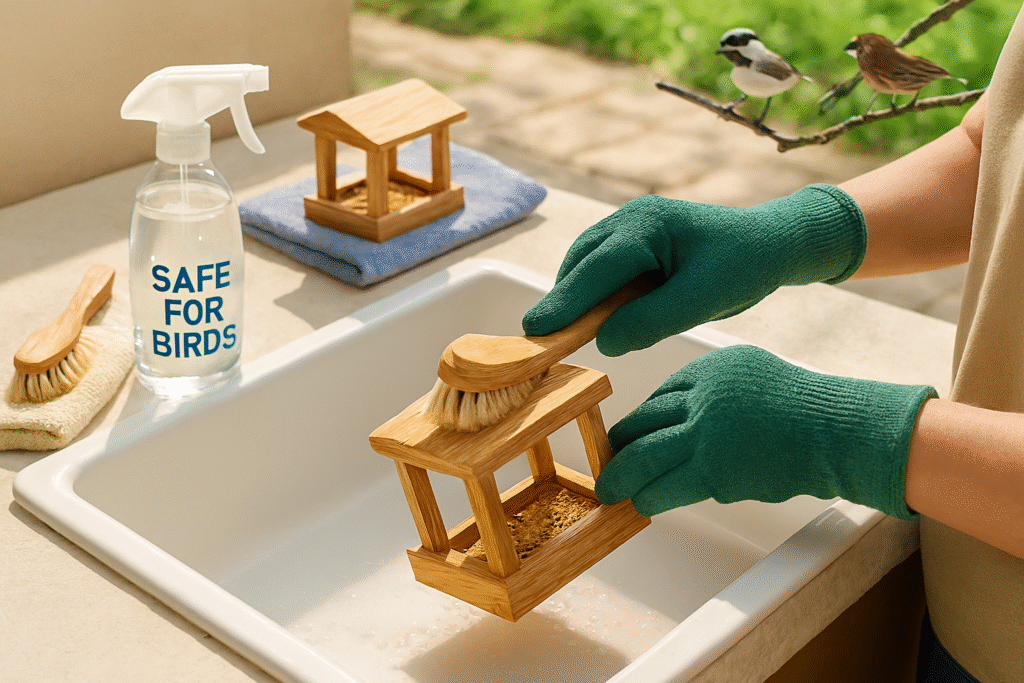If you’ve ever hosted a backyard buffet for the birds, you know it doesn’t take long for things to get… well, a little messy. Between spilled seed, droppings, and the occasional soggy snack, bird feeders can become breeding grounds for bacteria, mold, and unwanted pests if not properly cleaned and maintained. But don’t worry—keeping your feeders in tip-top shape is easier than you think, and it plays a crucial role in keeping your feathered guests safe and healthy.
Whether you’re new to bird feeding or you’ve got chickadees on a first-name basis, follow these tried-and-true tips to keep your feeders—and your backyard—clean, safe, and ready for winged visitors year-round.

🧽 1. Clean Feeders Regularly (At Least Every Two Weeks)
Bird feeders should be cleaned every two weeks, or more often during wet or humid weather. If you notice mold, clumped seed, or sick birds visiting, don’t wait—clean it immediately.
How to clean your feeder:
- Empty the feeder completely.
- Soak in a bleach solution (1 part bleach to 9 parts hot water) for 10–15 minutes.
- Scrub with a dedicated brush to remove any gunk or residue.
- Rinse thoroughly with clean water and let it dry completely before refilling.
🛠️ Helpful tip: Keep an extra feeder or two in rotation so you can clean one while the other stays in service.
🛡️ 2. Use the Right Tools (And Keep ‘Em Just for the Birds)
Avoid using your kitchen sponge—bird germs don’t belong near your dishes. Instead, stock a small cleaning kit:
- Long-handled bottle brush or old toothbrush
- Gloves
- Scraper for hardened debris
- Designated bucket or bin
- A safe disinfectant or vinegar solution
Hang the kit in your garage or shed and you’ll always be ready for feeder duty.
☀️ 3. Let Feeders Dry Completely Before Refilling
Damp seed = moldy seed. Moisture trapped inside a feeder is a fast track to harmful bacteria and spoiled food. Always let your feeders air dry completely after cleaning—preferably in the sun for extra sanitizing power.
🦠 4. Prevent Disease with Smart Feeding Habits
To reduce the risk of spreading avian illnesses:
- Don’t overcrowd feeders—spread out multiple feeders to reduce bird contact.
- Remove old or wet seed daily, especially in platform or tray feeders.
- Clean up seed hulls and droppings from the ground beneath your feeders.
- Avoid feeding if there’s a local bird disease outbreak (check local wildlife alerts).
Think of it as social distancing… for birds.
🛠️ 5. Check for Damage or Wear
Cracked plastic, rusted wire, sharp edges, or loose parts can injure birds or cause food contamination.
Inspect your feeders monthly and:
- Replace damaged parts or upgrade if needed.
- Tighten loose screws or hanging hooks.
- Repaint metal feeders with bird-safe, non-toxic paint if needed to prevent rust.
Pro tip: Squirrels are very good at “stress testing” your setup. If it’s squirrel-proof, it’s probably weather-proof too.
💡 6. Choose Easy-to-Clean Feeder Designs
If you’re buying a new feeder, go for models with:
- Wide openings for easy access
- Removable parts
- Smooth surfaces with few crevices
- Dishwasher-safe (for some tube feeders and hummingbird bottles)
The less complicated it is, the more likely you are to actually clean it—because let’s be honest, scrubbing nooks and crannies in February isn’t anyone’s idea of fun.
🧴 7. Clean Hummingbird Feeders Every Few Days
Sugar water spoils quickly, especially in warm weather. Clean nectar feeders every 2–3 days in summer, and once a week in cooler temps.
Use hot water and a vinegar or mild soap solution. Rinse thoroughly—hummingbirds are sensitive to residue!
🧹 8. Keep the Feeding Area Clean Too
Bird hygiene isn’t just about the feeder—tidy up the surrounding area:
- Rake up spilled seed and hulls weekly.
- Use a seed catcher or tray to reduce waste.
- Move feeders occasionally to prevent mold buildup in soil.
It’ll keep pests like rodents and insects at bay too—because nobody wants to host a rat rave under the finch feeder.
Final Thoughts: Clean Feeders = Happy, Healthy Birds
Regular cleaning is one of the simplest and most impactful ways you can support backyard bird health. A well-maintained feeder not only attracts more birds—it also keeps them coming back, chirping your praises (and probably scouting for more sunflower seeds).